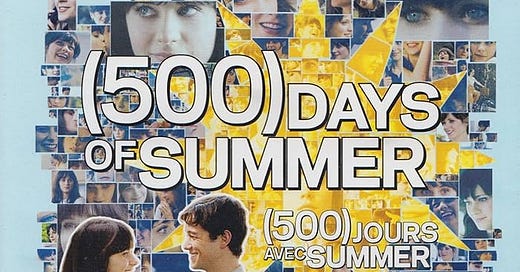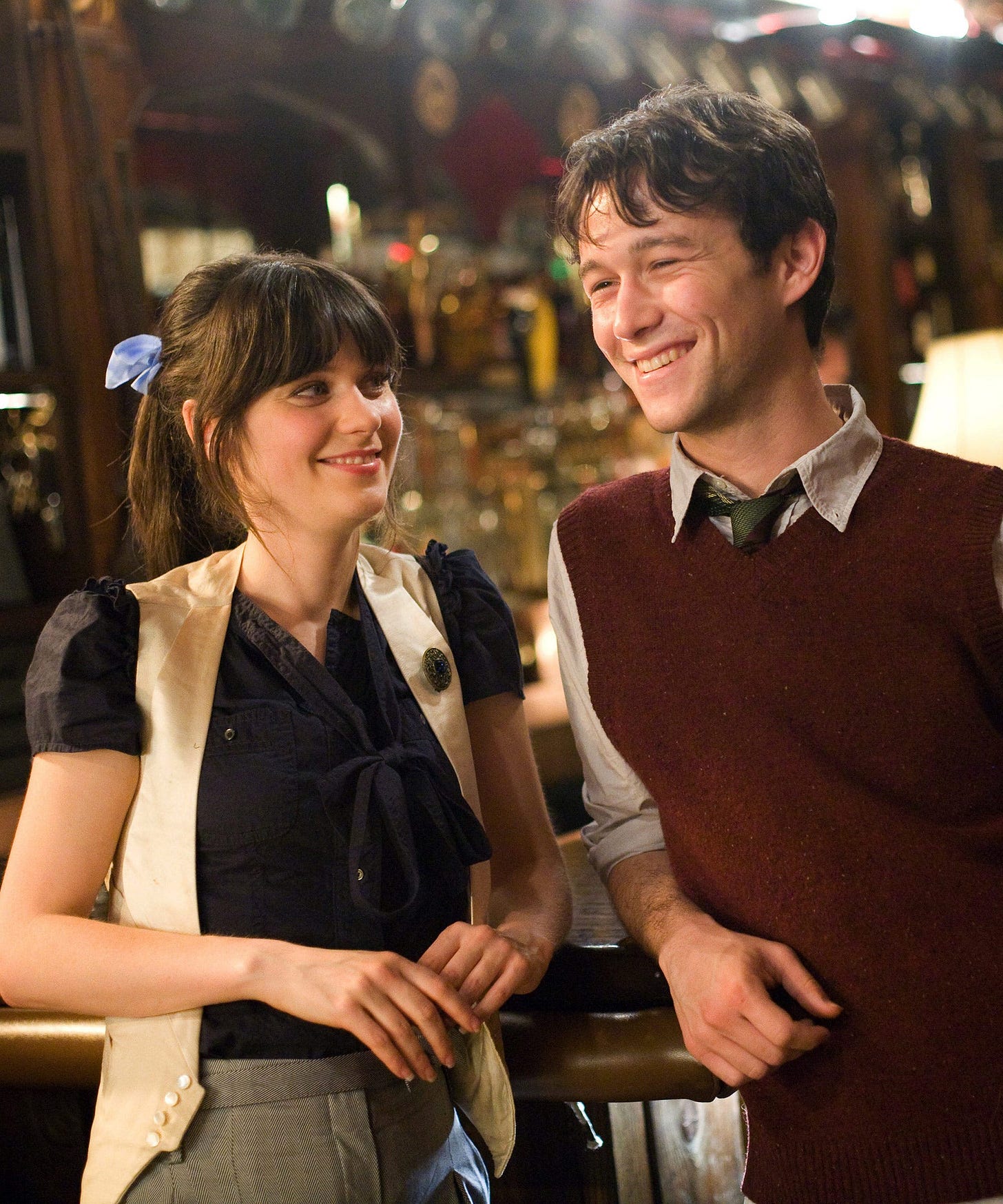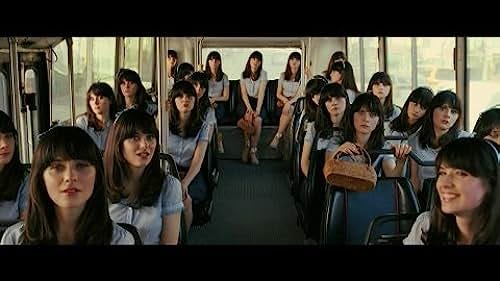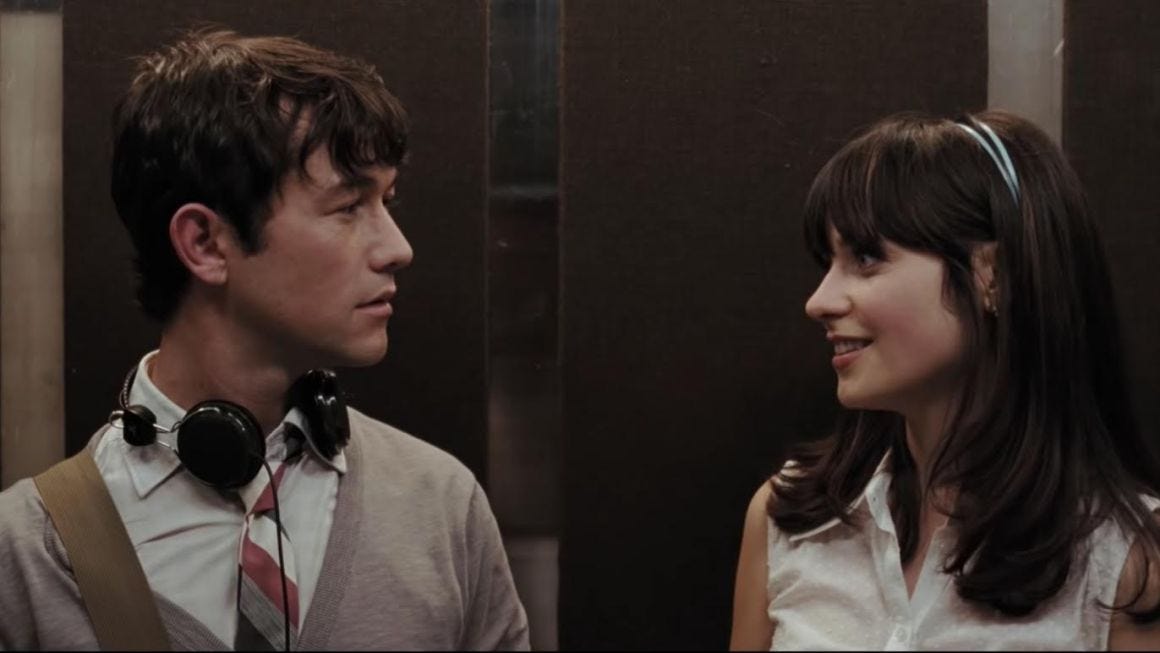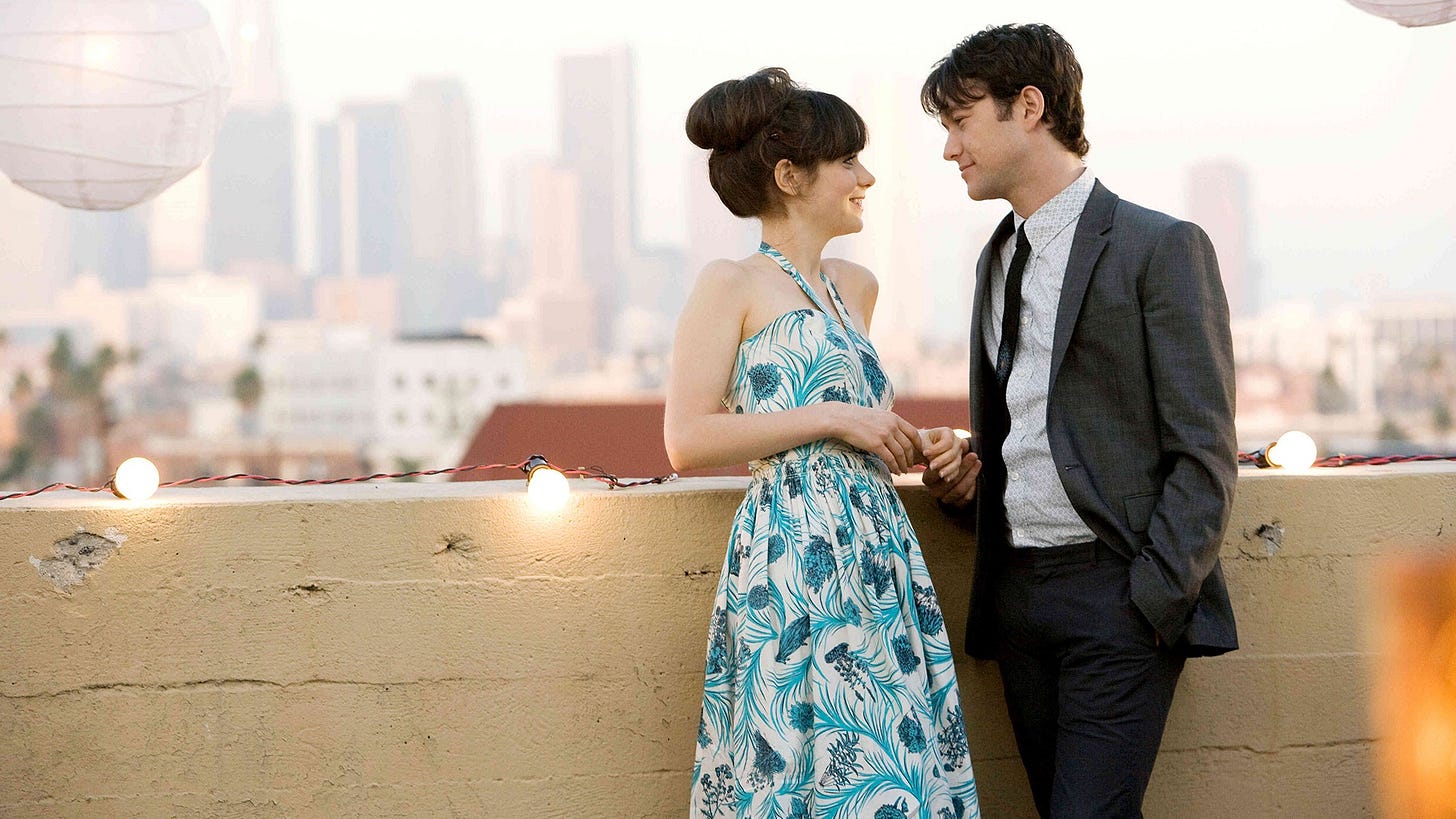The Favourites
(500) Days of Summer
(500) Days of Summer is the anti-romantic comedy. A film built on the torn-down remains of various tropes, writer-director Marc Webb’s carefully crafted insight into the mind of a man promised something the real world could never deliver is harsh and unforgiving in its portrayal of unrequited love. An insightful take on what the world of Hollywood has presented and how that is nothing but an illusion, the film is often miscategorized as a film engaging in cliche when instead it’s commenting on the false facade of them. Whether it’s the manic pixy dream girl, the meet-cute, or the post-break-up revelation, this film sets up every trope found in the romantic comedy only to show their toxic underpinnings.
The character of Tom is the epitome of the romantic comedy protagonist—a straight, white man in his mid-twenties who has a boring job and a generally dull life. Nothing is exciting about Joe, nothing that would turn heads if he was not the protagonist of this story. He is an everyman in every sense. Yet he holds this belief that the world stops and starts with him. He has the long-held belief that not only has love been promised to him but that he is owed it unconditionally. And while he blames the romantic comedies and romances of the world, the twisting of these stories into the narcissistic views he holds are all his own. Tom is someone who believes love to be a guarantee, not the gift it actually is.
This is what leads Tom to fail not just in his relationship with Summer but his failure in various other areas of life. He never reached for his dream career because he believed it would fall into his lap. He never strived for greatness at his current job because the work he is currently doing should be seen as the pinnacle. The world owes Tom for simply existing. This further exemplifies how Tom is emotionally immature; his inability to grasp that he is not a main character in a movie (ironic, I know) has made him stagnant. So when he eventually does fall into a relationship with Summer, even though she is reluctant to call it a relationship, he sees this as proof that he does not need to grow. His dreams (or at least this singular dream of love) are coming true.
This is why the end of the relationship is so devastating for Tom. For him this relationship was not just a romance, but a summation of his worldview. He was meant to get the girl, get the job, get the life he had always imagined. With this one fundamental building block of that vision taken away, the whole structure of his future crumbles. Summer breaks up with Tom on day 290, meaning their relationship lasted less than a year, and while that doesn’t necessarily mean the break-up wouldn’t hurt, Tom is fundamentally changed by this. His work suffers, his friendships suffer, and he spends weeks moping around and drinking heavily. This breakup symbolized the almost complete obliteration of his romantic daydreams. This is completely necessary to break Tom out of the fantasy life he has crafted for himself without the consideration of the other people in his life.
The fantasy world that Tom lives in is detrimental to not just his psyche but all his relationships. He sees his little sister as a child, even though she has the maturity of a much older person, indicating that her youth is a projection of Tom’s. The moments of connection that Tom has with Summer are mostly fleeting coincidences, and it’s only Tom’s import that injects gravitas into them. A fling for Summer is an all-out musical number for Tom. It’s the contrast between what we see as filtered through Tom’s vision and what we can interpret as actually happening that creates much of the emotional tension in the film. This can also explain the somewhat strange legacy this film can claim.
(500) Days of Summer can be mistaken by some as a “manic pixy dream girl” film. This interpretation can only exist in those who are close to the same emotional maturity as Tom. Tom sees Summer as an answer to his woes, and if the audience shares that view then they too have some maturing to do. In order to have that view, we must, like Tom, completely disregard Summer’s independence. She states constantly that she is not interested in being in a committed relationship with Tom, yet this is pushed aside in favor of overly romanticized moments of flirtation. Marc Webb’s direction certainly leads us to empathize more with Tom, but it doesn’t ever hide Summer’s true feelings. This legacy is what makes the film more vibrant and alive because the reading of the film grows along with the audience.
The complete disregard for Summer’s interiority is one of the main points of commentary the film has. At the end of the film, the audience doesn’t know anything about Summer. Her entire presence has been filtered to us through the eyes of Tom, and it shows that he never bothered to know her either. What little facts we do know are surface-level and superficial, like the enjoyment of The Smiths. While Tom sees this as an important aspect of her, it’s never shown if she is a super fan of them or simply someone who casually loves a song or two. And beyond this there is no substance to their relationship; Summer doesn’t want to be in love with Tom, and her refusal of him causes her to pull away from any real intimacy.
When Summer gets engaged so shortly after her break-up with Tom, we’re meant to be as shocked and heartbroken as he is. But neither we nor Tom have the right to question her decision, for we never find out what she wants in a relationship. The only thing we are ever certain of is Summer does not want Tom, something that looking at his treatment of her should not be surprising. Tom’s blindness to her as more than a romantic prop also blinds us, and it takes the shock of her engagement for both the audience and Tom to realize how Summer has been portrayed.
The most important scene in the film is expectations versus reality, otherwise known as the engagement party. In this scene, we are shown two versions of the party that Summer invites Tom to play in side-by-side. On the one side, we see the night as predicted by Tom. In this version, the romantic comedy tropes are played out to his wish fulfillment. Summer spends the entirety of the party with Tom as they joke, laugh, whisper sweet nothings, and eventually fall into bed with each other. In the other version, Tom arrives at the party and is quickly left to the wayside as other people in her life arrive. The night drags on and Tom, uninterested in conversing with anyone other than Summer, is despondent and distant, rebuffed at not being Summer’s center of attention. He reaches his breaking point after seeing Summer’s engagement ring, realizing what the party is. He leaves, embarrassed and shaken, and this leads to an even darker emotional spiraling for Tom.
This is the moment that the text and subtext overlap and Tom’s view of the world begins to shift. It’s the moment Tom realizes that Summer has a life outside of his feelings and view of him. His initial reaction to the break-up is anger, refusal to see that there were fundamental problems with their relationship. He sees the break-up as sudden and without warning when she had in fact been pulling away from him for a long time. The expectations versus reality scene forces Tom to see the life Summer had outside of him. She has other friends he has never met, other aspirations he has never questioned. When asked why she is getting married to her nameless fiance and not Tom, she simply states that she knows. With this scene, Tom is finally confronted with his inability to see Summer as an actual person.
The expectation versus reality scene also confronts the audience and what we want when watching romantic comedies. Many films within this subgenre follow the same tropes and beats; guy meets girl, guy loses girl, guy wins girl back. There are variations, but few truly choose to stray far from the formula. But this formula is not true to life, and our expectations for what (500) Days of Summer was going to play with these tropes. Even when the film’s narrator states off the top that this is not a love story, we are still expecting a romantic resolution between Summer and Tom until the engagement party. It forces us to decide what we really want out of these films, whether that be light, fluffy fantasy or truth. (500) Days of Summer lets us live the fantasy before showing us the cruelty behind that romantic myth. This scene is needed to elevate the film and demystify both the characters and the audience's expectations.
If Tom had learned anything... it was that you can't ascribe great cosmic significance to a simple earthly event. Coincidence, that's all anything ever is, nothing more than coincidence... Tom had finally learned, there are no miracles. There's no such thing as fate, nothing is meant to be. He knew, he was sure of it now.
It’s only after this scene that Tom truly attempts to change his ways. Summer’s response to his hurt, which she just knew when she truly loved someone else, shakes Tom to his core. It’s at this moment that his ridiculously long-held beliefs in soulmates and destiny are set aside. With this definitive end to the relationship, Tom can see that he is not guaranteed a life. He finally decides to not passively wait for the next chapter of his life to begin (it should be noted that Summer was the one to first make a move on Tom, further highlighting his inability to actively seek out life). He quits his job, reinvests himself into his architecture work, and goes on the hunt for a better life. Tom realizes that his expectations are set by himself and that he can not expect the world to bend to his whim simply through will. He learns that he is not the main character.
I think that is the most important takeaway from (500) Days of Summer. We are the writers of our destiny. While we can plead to the skies or pound the earth in agony, we are the only ones who can shape our futures. Whether that future is in love, work, or art, we have to take the reigns and make it happen on our own. There is comfort in fantasy, there is delight in fantasy, and fantasy can guide our hands when crafting our futures. But living in a fantasy will never make our lives complete, and relying on fantasy will only rob us of the delight of self-discovery. The seasons are changing, and as we fall into our five hundred days of summer, we can not waste it on wishes alone.
